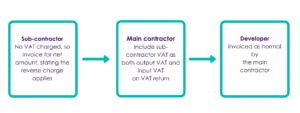The VAT domestic reverse charge will finally apply to most supplies of building and construction services from 1 March 2021. The rules, whose implementation has been postponed twice, cover standard and reduced rate VAT supplies between VAT-registered sub-contractors and contractors where reporting is required under the construction industry scheme (CIS).
The definition of construction services is based on the CIS definition, with various professional services excluded. However, unlike the CIS, the reverse charge applies to the total supply if any element in the supply is within the definition, subject to a 5% disregard.
Sub-contractors
The reverse charge applies if the following conditions are all met:
- The supply is within the scope of the CIS.
- The supply is standard or reduced rated (zero-rated supplies are excluded).
- The customer is VAT registered.
- The customer is CIS registered.
- The customer is not the end user (the final customer who does not make an onward supply – typically, the property developer).
Sub-contractors will no longer charge or account for output VAT, and invoices must state that the reverse charge applies.
Cashflow is likely to be affected for sub-contractors who will no longer benefit from retaining VAT before paying it over to HMRC. Moving to monthly VAT returns could be the best option for managing repayments.
Main contractor
The main contractor accounts for the VAT on the services of sub-contractors as output VAT, but can also usually claim a corresponding input VAT deduction.

The VAT reverse charge means adjustments for subcontractors and contractors. Detailed technical guidance from HMRC, including supplier and buyer flowcharts, can be found here.
